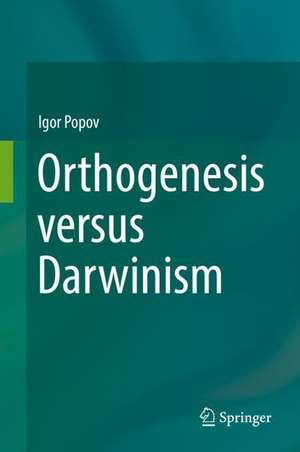Orthogenesis versus Darwinism
Autor Igor Popoven Limba Engleză Hardback – 3 sep 2018
Darwinism claims that evolution occurs by selection from an extensive random variability. An alternative viewpoint—that the material for variability is limited and organisms are predisposed to vary in certain directions—is the essence of evolutionary concepts that can be grouped together under the name of orthogenesis. Dating back to Lamarck, orthogenesis has existed in many guises. Branded as mystical and discarded as unscientific, it keeps re-emerging in evolutionary discussions.
| Toate formatele și edițiile | Preț | Express |
|---|---|---|
| Paperback (1) | 553.54 lei 38-44 zile | |
| Springer International Publishing – 2 ian 2019 | 553.54 lei 38-44 zile | |
| Hardback (1) | 560.67 lei 38-44 zile | |
| Springer International Publishing – 3 sep 2018 | 560.67 lei 38-44 zile |
Preț: 560.67 lei
Preț vechi: 700.83 lei
-20% Nou
Puncte Express: 841
Preț estimativ în valută:
107.29€ • 111.34$ • 89.68£
107.29€ • 111.34$ • 89.68£
Carte tipărită la comandă
Livrare economică 13-19 martie
Preluare comenzi: 021 569.72.76
Specificații
ISBN-13: 9783319951430
ISBN-10: 3319951432
Pagini: 190
Ilustrații: VI, 209 p. 19 illus., 3 illus. in color.
Dimensiuni: 155 x 235 mm
Ediția:1st ed. 2018
Editura: Springer International Publishing
Colecția Springer
Locul publicării:Cham, Switzerland
ISBN-10: 3319951432
Pagini: 190
Ilustrații: VI, 209 p. 19 illus., 3 illus. in color.
Dimensiuni: 155 x 235 mm
Ediția:1st ed. 2018
Editura: Springer International Publishing
Colecția Springer
Locul publicării:Cham, Switzerland
Cuprins
Part 1. Orthogenesis: a history.- Chapter 1. The sources. Formation of the concept of directed evolution in the 19th century.- Chapter 2. Evolutionary biology at the turn of the 20th century. New concepts of directed evolution in the 1900-1930s.- Chapter 3. Declarations in favour of orthogenesis in the 1900-1930s.- Chapter 4. Orthogenesis and the modern evolutionary synthesis.- Chapter 5. New concepts of directed evolution in the recent history of evolutionary biology.- Chapter 6. Statements in support of orthogenesis in the 1950s and later.- Part 2. Orthogenesis: Pro et Contra.- Chapter 7. “Laws” in biology. - Chapter 8. Species senescence.- Chapter 9. Adaptation or non-adaptation? .- Chapter 10. Anticipation, parallelisms and convergences.- Chapter 11. Constraints on variation.- Chapter 12. Direct impact of the environment on evolution and the inheritance of acquired characteristics.- Chapter 13. Mystics or unrealised synthesis? Chapter 14. Conclusion.
Recenzii
“The volume focuses on and evaluates orthogenesis as a framework for understanding biological phenomena including aging, extinction, and convergent evolution. Each chapter is well referenced, and the entire volume is engagingly translated from the original Russian. … The book will be of interest for historians of science, and thought provoking, … for biological researchers. Summing Up: Recommended. Graduate students, researchers, and professionals.” (D. P. Genereux, Choice, Vol. 56 (11), July, 2019)
Textul de pe ultima copertă
This book reviews the convoluted history of orthogenesis with an emphasis of non-English sources, untangles relationships between various concepts of directed evolution and argues whether orthogenesis has something to offer modern biology.
Darwinism claims that evolution occurs by selection from an extensive random variability. An alternative viewpoint—that the material for variability is limited and organisms are predisposed to vary in certain directions—is the essence of evolutionary concepts that can be grouped together under the name of orthogenesis. Dating back to Lamarck, orthogenesis has existed in many guises. Branded as mystical and discarded as unscientific, it keeps re-emerging in evolutionary discussions.
Darwinism claims that evolution occurs by selection from an extensive random variability. An alternative viewpoint—that the material for variability is limited and organisms are predisposed to vary in certain directions—is the essence of evolutionary concepts that can be grouped together under the name of orthogenesis. Dating back to Lamarck, orthogenesis has existed in many guises. Branded as mystical and discarded as unscientific, it keeps re-emerging in evolutionary discussions.
Caracteristici
Broadens the understanding of non-Darwinian scientific concepts Clarifies the differences between various orthogenetic concepts by analysing their history and relationships Maximizes reader insights into the main points of scientific criticism of the natural selection theory Opens new vistas for the elaboration of alternative evolutionary concepts Takes into account publications in five languages (English, Russian, French, Spanish, German)
